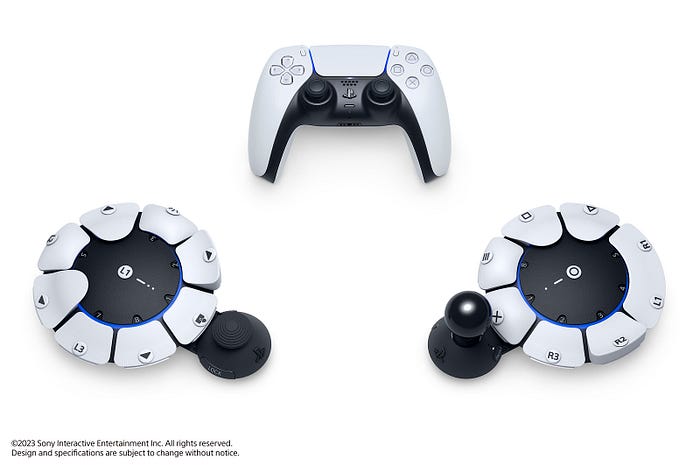

Sony’s video game controllers and the Disability Tax
source link: https://uxdesign.cc/sonys-video-game-controllers-and-the-disability-tax-4a2cbbfc2f35
Go to the source link to view the article. You can view the picture content, updated content and better typesetting reading experience. If the link is broken, please click the button below to view the snapshot at that time.

Sony’s video game controllers and the Disability Tax

Sony promotional image for Project Leonardo.
This week Sony announced Project Leonardo, their venture into accessible technology for the Playstation. Since Microsoft launched the adaptive controller in 2018, many fans of the Playstation and its exclusive titles have been disappointed in the lack of an accessible way to play their favorite console.
I previously wrote an article about the Xbox Adaptive Controller (XAC) and its issues, with the main one being cost. With the impending launch of Project Leonardo, however, there’s another facet of this issue that merits discussion: proprietary technology and the disability tax.
Both Sony and Microsoft make tech for their respective consoles. This isn’t news to anyone, and this isn’t something I see most people have a problem with. Most people aren’t angry that they can’t use their Xbox controller on their Playstation (at least not without some tech knowledge and ingenuity).
However, I think it’s safe to say that most gamers would be pretty upset if they had to buy their controller in addition to their console. I mean, you need the controller to use the console. It would be pretty scummy for a company to sell you the console, then make you pay extra if you want to use it.
And yet, this is what many disabled people have to do. Bundles combining a console and adaptive controller don’t really exist unless you go to a physical store and the salesperson likes you. This means you have to pay extra just to use the console.
This phenomenon of disabled people having to pay more for something than they would if they weren’t disabled is part of the disability tax.
The disability tax is a relatively broad term that describes the extra financial, physical, or emotional labor disabled people must put up with to accomplish or access the same things as their nondisabled peers. This article published in the journal Including Disability describes the disability tax faced by people as the world adapted to the COVID-19 pandemic.
Most often, disability tax is used to refer to the increased price of any product or service that is specifically for disabled people. In this video posted to Linkedin, Tiffany Yu demonstrates the disability tax by comparing two sets of knives and cutting boards. The typical set costs only $3, while the set adapted for one handed use cost $87. Most products designed for disabled people carry this kind of financial mark-up.
Tiffany A. Yu, MSc on LinkedIn: #antiableism #disability #disabilityawareness #ableism…
Day 27 The "disability tax": a $3 knife and cutting board vs $87 designed for those who can only use one hand Video…
This is bad enough to play on one console, but what happens if you want to play games exclusive to various consoles? It’s not uncommon for gamers to own multiple gaming consoles, yet having to buy a special controller will make this harder for disabled gamers.
This is where the issue of proprietary technology comes in. A disabled gamer who’s already spent hundreds on an adaptive controller that suits their needs will have to buy a new controller if they want to get a new console, or even if they just want to play on a friend’s console. Since these controllers are console specific, this is our only option.
I wish there were adaptive controllers that could be used on multiple consoles without being jury rigged. I tried doing this to play my Nintendo Switch, but all the buttons were mapped wrong, and I kept having to switch the controller between the Switch and Xbox to get the settings right. This involved moving the cord between the two consoles, which I couldn’t do. Thus, this method wasn’t feasible for me, since the adaptive controller was supposed to give me more independence, not less.
Since Project Leonardo has just been announced, we don’t know how much it’s going to cost. Given its increased complexity over the base XAC, it’ll likely be well over $100.
Adding in all the joysticks and other accessories, I don’t know exactly how much money I spent on my XAC setup, but I do know I spent more on that than on my Xbox. Even if I could muster up the money for a Playstation, I doubt I could afford the adaptive controller.
We need compatibility in these adaptive controllers, or the disability tax will continue to be compounded on disabled gamers. I’d gladly trade-in the normal Xbox controller that permanently sits in my drawer and never gets used for a way to play on a Playstation without basically buying two of them.
Recommend
About Joyk
Aggregate valuable and interesting links.
Joyk means Joy of geeK